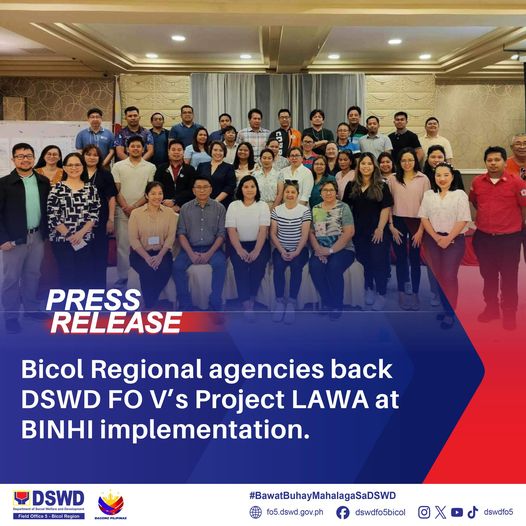
DSWD Field Office 5’s Project LAWA at BINHI received a positive response from various regional/national agencies and stakeholders during the Convergence Planning and Budgeting under the Risk Resiliency Program (RRP) held in Naga City, Camarines Sur from April 24 to 26, 2024.
During the activity, DSWD FO V officials introduced the importance of implementing the program, especially in combating climate change in the country.
Key topics addressed during the discussion included program specifics, processes, modalities, target areas, beneficiaries, and the roles of partner agencies in ensuring the project’s success.
As a result, the Forest Foundation Philippines extended a collaborative partnership to the DSWD Field Office for the implementation of Project LAWA at BINHI in select areas within the region.
The Forest Foundation Philippines, a non-profit organization providing grants and technical assistance to individuals and organizations that protect and conserve the forests, was established in 2002 under two bilateral agreements between the governments of the United States of America and the Philippines through the US Tropical Forest Conservation Act.
During consultations with other regional agencies, the Department of the Interior and Local Government 5 (DILG) and the Department of Agriculture Regional Office 5 also pledged their support for the program.
With DA’s commitment, the program gains substantial backing, ensuring the provision of seedlings for planting and essential tools. This commitment includes not only logistical aid but also comprehensive training, site assessment, validation, and technical assistance for the program’s partner-beneficiaries.
DILG also ensures that the program will be discussed during their dialogues with the recipient LGUs and provides legal documentation in institutionalizing the program at the local level.
Project LAWA at BINHI, or the Local Adaptation to Water Access (LAWA) and Breaking Insufficiency through Nutritious Harvest for the Impoverished (BINHI), aims to strengthen the adaptive capabilities of poor and vulnerable families during severe droughts and mitigate food insecurity and water scarcity caused by the El Niño phenomenon.
It is also one of the proactive interventions and sustainable solutions of the Development to combat hunger, alleviate poverty, and decrease the economic vulnerability of communities by addressing food insecurity and water scarcity exacerbated by disasters and climate change in the country.
In the Bicol Region, 15 identified municipalities with 4,773 target partner-beneficiaries from the provinces of Masbate, Catanduanes, and Sorsogon are recipients of Project LAWA at BINHI through Cash-for-Training and Work program.###
